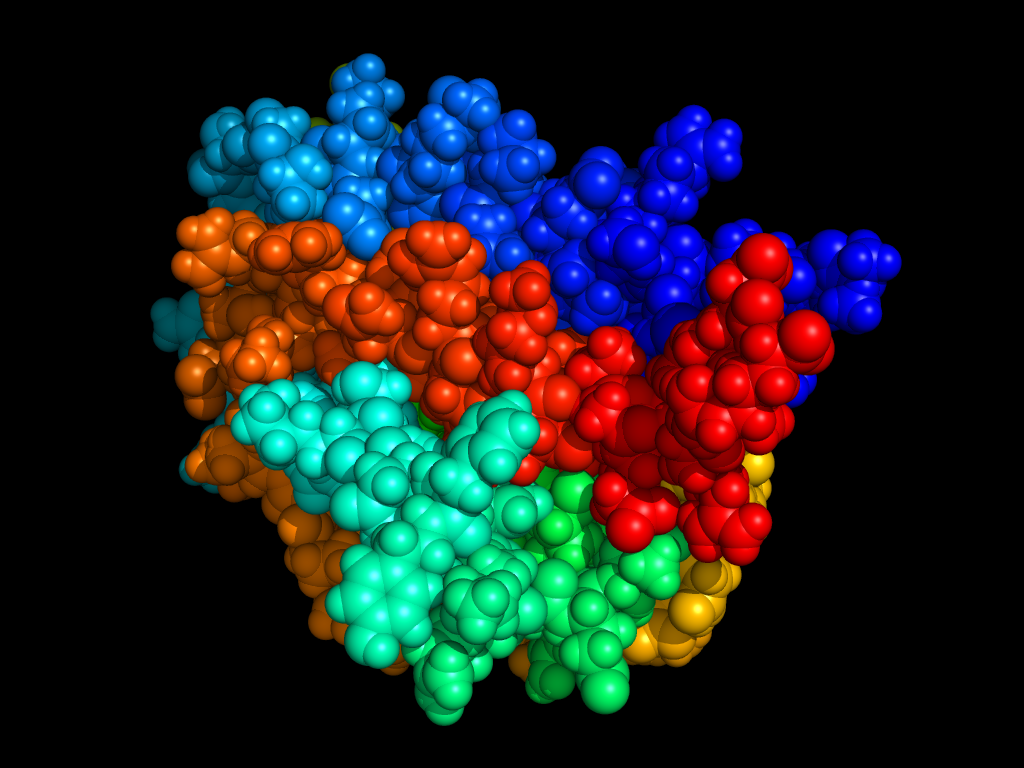
- Details
- ICNA
- News
- Hits: 677
High-dose erythropoietin (EPO; a hormone) administered within 42 hours of birth to preterm infants was associated with a reduced risk of brain injury, as indicated by magnetic resonance imaging, according to a study in the August 27 issue of JAMA.
Premature infants are at risk of developing encephalopathy of prematurity, which is associated with long-term neurodevelopmental delay. Erythropoietin has been shown to be neuroprotective in experimental and retrospective clinical studies.
Russia Ha-Vinh Leuchter, M.D., of the University Hospital of Geneva, Switzerland, and colleagues conducted a study in which 495 infants (born from 26 weeks to 31 weeks and 6 days of gestation) were randomly assigned to receive recombinant human erythropoietin (n=256) or placebo (n=239) intravenously before 3 hours, at 12 to18 hours, and at 36 to 42 hours after birth. In a nonrandomized subset of 165 of the 495 infants (n=77 erythropoietin; n=88 placebo), brain abnormalities were evaluated on magnetic resonance imaging (MRI) acquired at term-equivalent age.
The researchers found that at term-equivalent age, compared with untreated controls, fewer infants treated with recombinant human erythropoietin had abnormal scores for white matter injury (22 percent vs 36 percent); white matter signal intensity (3 percent vs 11 percent); periventricular white matter loss (18 percent vs 33 percent); and gray matter injury (7 percent vs 19 percent).
These findings will require assessment in a randomized trial designed primarily to assess this outcome as well as investigation of the association with neurodevelopmental outcomes.
'Reference:
Association Between Early Administration of High-Dose Erythropoietin in Preterm Infants and Brain MRI Abnormality at Term-Equivalent Age,' Hüppi et al, JAMA, doi:10.1001/jama.2014.9645, published 27 August 2014, abstract.
Read More
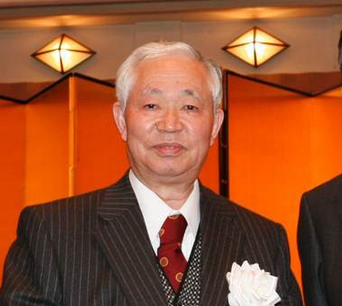
- Details
- ICNA
- News
- Hits: 3056
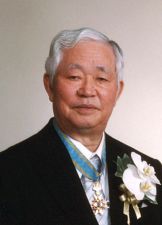 It is with great sadness that we announce the death of Professor Yukio Fukuyama, a true pioneer in the field of pediatric neurology who chaired the Department of Pediatrics at Tokyo Women’s Medical University, for a quarter of a century, teaching and mentoring young doctors and leading us into the 21st century. The depth and breadth of his accomplishments are a testament to his commitment to patients, their families, the university, his coworkers and advances in pediatric neurology worldwide. He will be sorely missed by friends and colleagues alike, thanks to his tireless efforts to advance Child Neurology, always based on his belief in “slow but steady” progress.
It is with great sadness that we announce the death of Professor Yukio Fukuyama, a true pioneer in the field of pediatric neurology who chaired the Department of Pediatrics at Tokyo Women’s Medical University, for a quarter of a century, teaching and mentoring young doctors and leading us into the 21st century. The depth and breadth of his accomplishments are a testament to his commitment to patients, their families, the university, his coworkers and advances in pediatric neurology worldwide. He will be sorely missed by friends and colleagues alike, thanks to his tireless efforts to advance Child Neurology, always based on his belief in “slow but steady” progress.
Professor Fukuyama (DOB: 28 May, 1928, Birthplace: Miyazaki, Japan) passed away on July 17, 2014, due to aspiration pneumonia, at the age of 86.
Home Address: 6-12-16 Minami-Shinagawa, Shinagawa-ku, Tokyo 140-0004, Japan
Office Address: Child Neurology Institute, 6-12-17-201, Minami-Shinagawa, Shinagawa-ku, Tokyo, 140-0004, Japan
Survived by: Mrs. Ayako Fukuyama
Most recent Positions:
Emeritus Professor, Tokyo Women’s Medical University, Tokyo
Honorary Chairman, Board of Trustees, Japanese Society of Child Neurology
Honorary President, Asian & Oceanian Child Neurology Association
Honorary Chairman of Infantile Seizure Society
Major Fields of Interest:
Child neurology, with emphasis on pediatric epileptology, pediatric neuro-muscular disorders, clinical neurogenetics, international relations
Honorary Memberships in Academic Societies:
Honorary Chairman, Board of Trustees, Japanese Society of Child Neurology (since 1993)
Honorary President, Asian & Oceanian Child Neurology Association (since 1992)
Honorary Chairman, Infantile Seizure Society (since 2013)
Honorary Member of the following societies:
American Academy of Neurology (since 1990)
American Neurological Association (since 2006)
Canadian Child Neurology Society (since 1985)
Child Neurology Society (US) (since 1986)
European Paediatric Neurology Society (since 2005)
International Child Neurology Association (since 2010)
Japan Epilepsy Society (since 1998)
Japan Pediatric Society (since 1999)
Japanese Society of Neurology (since 2000)
Japanese Society of Clinical Neurophysiology (since 1995)
Japanese Society of Human Genetics (since 1999)
Japan Teratology Society (since 1998)
Philippine Child Neurology Society (since 2008)
Active Member of the following societies:
American Association for the Advancement of Science
American Epilepsy Society
American Society of Human Genetics
Corresponding Member of the:
Sociétè Européenne de Neurologie Pédiatrique (since 2002)
4th President
International Child Neurology Association (1982-1986)
President
The Joint Meeting of the 5th International Child Neurology Congress and the 3rd Asian & Oceanian Congress of Child Neurology, Tokyo, November 1990.
President
Infantile Seizure Society (1998-2001, 2005-2012)
Education:
University: Faculty of Medicine, University of Tokyo, 1948-1952
Internship: University of Tokyo Hospital, Tokyo, 1952-1953
Postgraduate: Postgraduate Course, Faculty of Medicine, University of Tokyo, Tokyo, 1954-1957
Doctorate: University of Tokyo, 1957
Diploma of Medicine: University of Tokyo, 1959
Career:
Clinical Associate: Department of Pediatrics, University of Tokyo, 1957-1960
Assistant Professor: (same) 1960-1964 Associate Professor: (same) 1964-1965
Chief Pediatrician: National Children’s Hospital, Tokyo, 1965-1967
Professor & Chairman: Department of Pediatrics, Tokyo Women’s Medical College, Tokyo, 1967-1994
Guest Professor: Department of Pediatrics, Saitama Medical University, Saitama, 1994-1999
Emeritus Professor: Tokyo Women’s Medical University, Tokyo 1994-present
Director: Child Neurology Institute, Tokyo 1994-present
President: Infantile Seizure Society, Tokyo 1998-present
Awards:
1989 Kimura Taro Prize, Japanese Epilepsy Association
1992 Frank Ford Lectureship Award, International Child Neurology Association
1993 Achievement Award, Japan Epilepsy Research Foundation
1996 Bronze Medal, Societa Italiana di Neuropediatria
1999 Duchenne-Erb Prize, Deutsche Gesellschaft für Muskelkranke
1999 Achievement Award, Japanese Society of Human Genetics
1999 Achievement Grand Award, Japan Medical Association
2002 Lifetime Achievement Award, World Federation of Neurology
2003 International Henri Gastaut Prize, French Chapter of the ILAE
2004 The William G. Lennox Award, American Epilepsy Society
2007 Ambassador for Epilepsy Award, ILAE/IBE
2008 The Asahi Award
2007 The Asahi Shimbun Cultural Foundation
2008 Achievement Grand Award
2008 Japan Pediatric Society
2008 Special Recognition Award, Japanese Society of Child Neurology
2008 The Order of the Sacred Treasure, Gold Rays with Neck Ribbon, The Cabinet Office, Japanese Government
2010 The First Japan Epilepsy Society Outstanding Achievement Award.
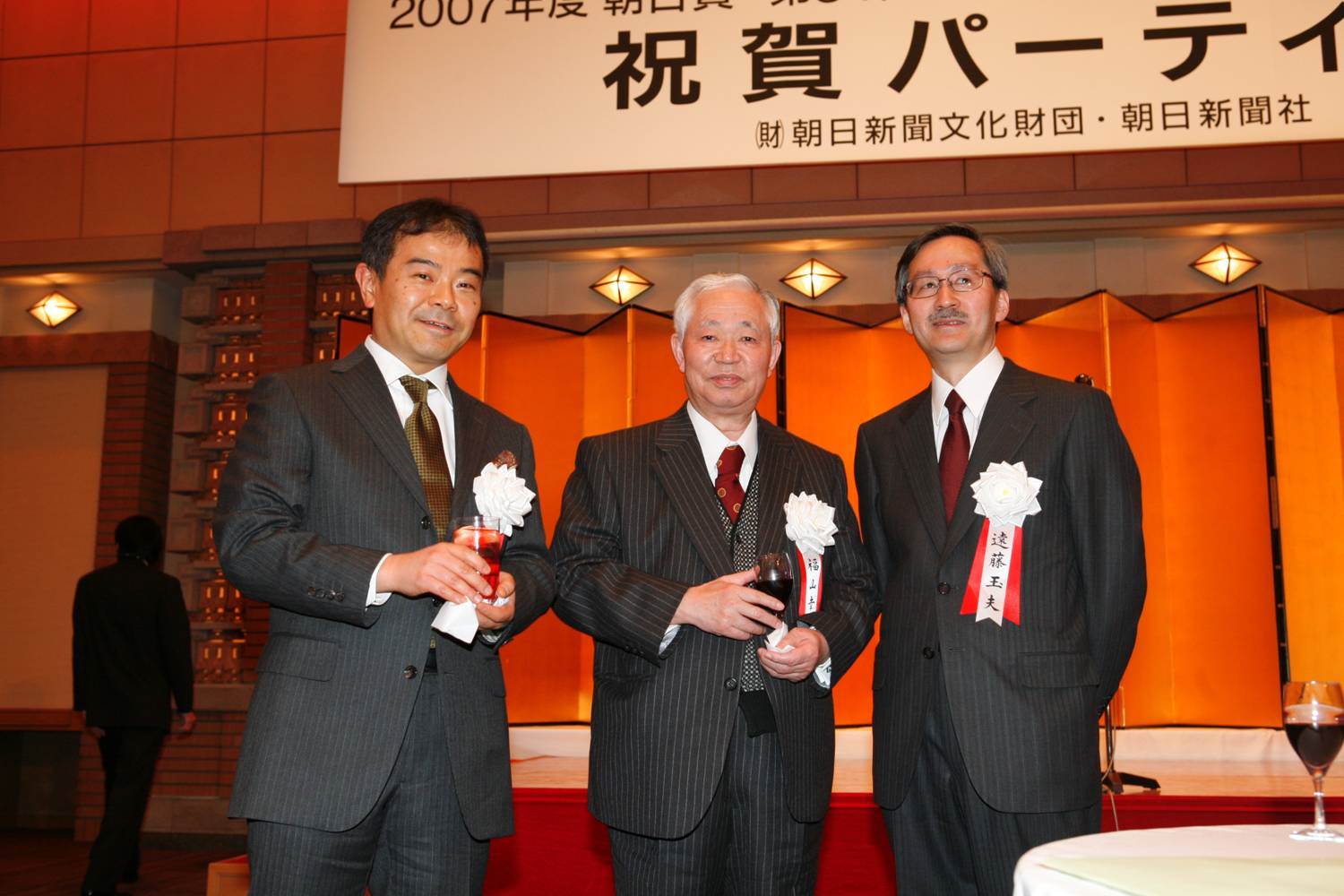 The Team Studying FCMD and Related Conditions Won ‘07 Asahi Award – January 1, 2008 [L-R: Tatsushi Toda;Yukio Fukuyama; Tamao Endo]
The Team Studying FCMD and Related Conditions Won ‘07 Asahi Award – January 1, 2008 [L-R: Tatsushi Toda;Yukio Fukuyama; Tamao Endo]
Selected List of Books (first-author or editor):
Epilepsy. The Clinic and The Research. Igaku Shoin, Tokyo, 1974. 666 pp.(in Japanese)
Clinical Aspects of Epilepsy. Tokyo Igaku Publ, Tokyo, 1977. 314 pp. (in Japanese)
Child Neurology. Elsevier, Amsterdam, 1982. 419 pp.
Epilepsies in Childhood. 2nd ed. Ishiyaku Publ, Tokyo, 1984. 204 pp. (in Japanese)
Child Neurology Atlas. Shindan To Chiryo Publ, Tokyo, 1986. 368 pp. (in Japanese)
Neurological Examinations in Children. Kanehara Publ, Tokyo. 1987. 324 pp. (in Japanese)
EEG and Evoked Potentials in Children. Kanehara Publ, Tokyo, 1990. 369 pp. (in Japanese)
Modern Perspectives of Child Neurology. JSCN, Tokyo, 1991. 360 pp.
Febrile Seizures –Modern Concept–. Nihon Shoni-iji Publ, Tokyo, 1991. 156 pp. (in Japanese)
Fetal and Neonatal Neurology. Elsevier, Amsterdam, 1992. 388 pp.
Crossroads of Child Neurology. TWMU, Tokyo, 1995. 728 pp.
Congenital Muscular Dystrophies. Elsevier, Amsterdam, 1997. 440 pp.
Epilepsy Bibliography - Books and Monographs. (1945-2003). 8th print ed. Seiwa Shoten: Tokyo, 2004. 234 pp.
Biology of Seizure Susceptibility in Developing Brain, John Libbey Eurotext, Montrouge 2008. 231 pp.
Epilepsy Bibliography – Books and Monographs (1945-2009). 10th ed. Online. ILAE website
Recent Publications in Journals:
- Fukuyama Y, ed. West syndrome and other infantile epileptic encephalopathies. Brain & Development 2001; 23(7): 441-769.
- Fukuyama Y, ed. Chromosomal aberrations and epileptic syndromes. Brain & Development 2005; 27: 79-147 and 358-391.
- Fukuyama Y, ed. Neuronal migration disorders and childhood epilepsies. J Child Neurol 2005; 20(4): 273-397.
- Maeda Y, Fukuyama Y, et al. Rasmussen syndrome: Multifocal spread of inflammation suggested from MRI and PET findings. Epilepsia 2003; 44: 1118-1121.
- Dravet C, Fukuyama Y, et al. Severe myoclonic epilepsy in infancy: Dravet syndrome. Advances in Neurology 2005; 95: 71-102.
- Oguni H, Fukuyama Y, et al. Severe myoclonic epilepsy in infancy: Clinical analysis and relation to SCN1A mutation in a Japanese cohort. Advances in Neurology 2005; 95: 103-113.
- Dravet C, Fukuyama Y, et al. Severe myoclonic epilepsy in infancy (Dravet syndrome). In: Roger J, et al. Epileptic syndromes in infancy, childhood and adolescence. 4th Ed. John Libbey Eurotext, Montrouge. 2005: 89-113.
- Fukuyama Y, Sakauchi M. Syndromes des crises bénignes du nourrisson. Epilepsies 2006; 18(1): 8-23.
- Fukuyama Y, ed. Epileptic syndromes in infancy and early childhood. Epilepsy Res 2006; 70 Supplement: 279 pages.
- Kato N, Fukuyama Y, et al. Paroxysmal kinesigenic choreoathetosis: From first discovery in 1892 to genetic linkage with benign familial infantile convulsions. Epilepsy Res 2006; 70 Suppl: S174-S184.
- Fukuyama Y, ed. Status epilepticus in infants and young children. Acta Neurol Scand 2007; 115 Suppl 186: 86 pp.
- Fukuyama Y. History and perspectives of Fukuyama congenital muscular dystrophy research. Brain and Nerve; 2008; 60(1): 43-52.
- Fukuyama Y. Japanese activities in epileptology assessed from an international viewpoint – On the occasion of winning the ILAE/IBE Ambassador for Epilepsy Award 2007 –. Tenkan Kenkyu (J Jpn Epilepsy Soc) 2008; 26: 87-93. (in Japanese with English abstract)
- Fukuyama Y, Takahashi T, Hirose S, Takeuchi Y, guest editors. Febrile seizures and related conditions. Special sections I and II. Brain & Development 2009; 31(5): 358-404; Brain & Development 2010; 32(1): 33-77.
- Fukuyama Y, Takahashi T, Hirose S, Matsuishi T, guest editors. Epilepsy in autism spectrum disorders and related conditions. Brain & Development 2010; 32(9): 708-789.
A memorial service is being organized by the Alumni Association of the Department of Pediatrics, School of Medicine, Tokyo Women’s Medical University. The tentative date is October 4th, the Saturday after the 48th Congress of the Japan Epilepsy Society at the Keio Plaza Hotel, starting at 18:30.
Makiko Osawa, MD, PhD.
President Japan Epilepsy Society
Chairperson Infantile Seizure Society
Professor Emeritus Chairperson of Alumuni Association Department of Pediatrics
Tokyo Women's Medical University 8-1 Kawada-cho, Shinjuku-ku, Tokyo
162-8666 TEL:+81-3-3353-8111 FAX:+81-3-5379-1440
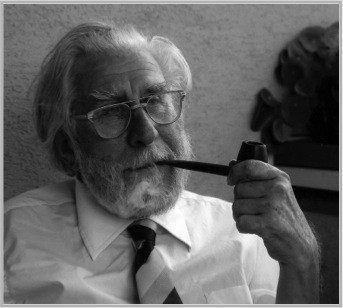
- Details
- ICNA
- News
- Hits: 3719
Born in Vienna on the 6th of July 1927, Heinz F. R. Prechtl studied medicine, zoology, and anthropology at the University of Vienna. In 1951, he followed his mentor, the founder of ethology and later Nobel Prize laureate Konrad Lorenz to the Max Planck Institute for Behavioural Physiology in Buldern, Germany. Within five years his observational focus had moved from birds, lizards, salamanders, and cats to human infants. In 1955 he published a series of films on the sucking, grasping, posture and locomotion of human newborns and infants.
His groundbreaking ideas and scientific vision led him to Groningen, where he became Professor of experimental neurology at the age of 35. Under his aegis, developmental neurology was born four years later (1968) with ontogenetic adaptation as one of its basic principles: the functional repertoire of the developing neural structure must meet the requirements of the organism and its environment. It was essential to Heinz Prechtl that immaturity (deriving from an irrelevant reference to later developmental stages) does not exist if the various developmental stages are studied in their own right. Consequently, already in 1968, he postulated that age-related vulnerability causes age-specific lesions and requires both age-adequate diagnostic procedures and interventions.
In the early 1970s, Prechtl found that the neural functions of the newborn infant are characterized by a strict dependency on behavioural states. In his Duivenvoorde Lecture (1974) he summarized the five behavioural states of the newborn infant as distinct – and not continual – modes of the nervous system. Prechtl strove to prove that the distinction of behavioural states is essential for the neurological examination of the newborn since, for example, reactions to proprioceptive stimulations are exaggerated during state 1 but can hardly be elicited during state 2, whereas reactions to exteroceptive stimulations cannot be seen during state 1 but typically occur during state 2. Thus, each manoeuvre of the Prechtl Neurological Examination of the Fullterm Newborn Infant (1977) is standardised for behavioural states.
Already in his Award Lecture of the Mental Health Research Fund in London (1967) Prechtl introduced another milestone of his scientific oeuvre, the optimality concept. In a study on 1.500 newborns, he elaborated on this concept by defining optimal conditions for both each perinatal variable and the neurological findings instead of using the normal/abnormal dichotomy (1980).
Observing low-risk preterm infants, Heinz Prechtl started wondering about the prenatal origin of the many spontaneous movement patterns. In the early 1980s the ultrasound equipment in obstetrics had improved substantially enough to allow a detailed observation of the fetus. His descriptions of fetal behaviour were an eye-opener and revealed that fetal behaviour is patterned right from the beginning (8 weeks postmenstrual age). Although very different in nature, abrupt startles and complex general movements (GMs) are among the first movements and emerge at the same time; they are followed by isolated limb movements a mere week later.
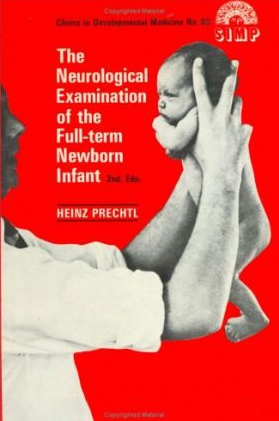 Already at 12 weeks, the fetus has a rich repertoire of spontaneous endogenously generated movements: startles, GMs, hiccup, isolated arm and leg movements, side-to-side movements of the head, ante- and retroflexion of the head, breathing movements, opening and closing of the fingers, jaw movements, stretching and yawning. In one of the Clinics in Developmental Medicine, Prechtl described the continuity of this complex behavioural repertoire from prenatal to postnatal life, followed by a significant behavioural transformation at 3 months of age (1984).
Already at 12 weeks, the fetus has a rich repertoire of spontaneous endogenously generated movements: startles, GMs, hiccup, isolated arm and leg movements, side-to-side movements of the head, ante- and retroflexion of the head, breathing movements, opening and closing of the fingers, jaw movements, stretching and yawning. In one of the Clinics in Developmental Medicine, Prechtl described the continuity of this complex behavioural repertoire from prenatal to postnatal life, followed by a significant behavioural transformation at 3 months of age (1984).
Prechtl's observation that high-risk infants move differently compared to typically developing infants marked a new approach to assessing the young nervous system: the assessment of general movements, or GMs (1990). During the last 25 years it has been extensively proven that the patterns of GMs are sensitive indicators of certain neurological impairments, and are hence regarded as a window into the developing brain.
Heinz Prechtl received numerous honours and awards for his scientific achievements, including the Folke Bernadotte Award, the Heinrich Hoffmann Award, the Kenneth Craik Award, the Maternity Award of the European Society of Perinatal Medicine, the Cornelia de Lange Prize, and the Prize of the Dutch Science Foundation. He was a Mac Arthur and Ronnie Mac Keith lecturer, received honorary degrees in medicine from the Universities of Graz and Genoa, and became Honorary Fellow of the Royal Academy of Obstetrics and Gynaecology. In 1990, he was knighted by the Queen of the Netherlands.
Heinz Prechtl was a polymath with a deep interest in music (from Monteverdi to Mahler), paintings (particularly the Flemish masters of the 15th and 16th centuries and Piero della Francesca, but also the "Twittering Machine" by Paul Klee) and books. He never read just one book at a time; the copies he left behind on his desk were Safranski's biography of Goethe, a crime story, two books about proverbs and their origin, and one about French Baroque masters.
Heinz Prechtl's influence on so many people was truly impressive. There was nothing pretentious about him. All of us who knew him well will sometimes – mostly when we struggle to explain our thoughts – hear him say: "What exactly do you mean?" or "Why do you think so?" Words like these will carry on his legacy in the studies of early human development.
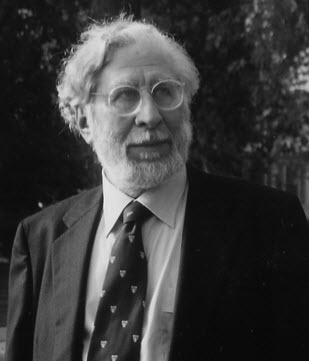 On July 3rd 2014, just three days before his 87th birthday Heinz Prechtl passed away peacefully but what he left us and developmental neuroscience, he will be forever.
On July 3rd 2014, just three days before his 87th birthday Heinz Prechtl passed away peacefully but what he left us and developmental neuroscience, he will be forever.
Submitted by:
Dr. Christa Einspieler, DPhil, PhD
Professor of Physiology
Institute of Physiology, Research Unit iDN - interdisciplinary
Developmental Neuroscience Center for Physiological Medicine
Medical University of Graz
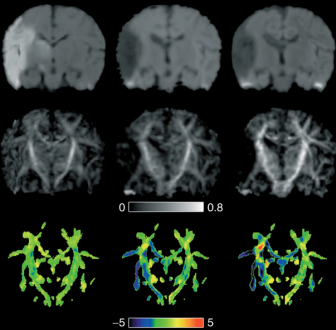
- Details
- ICNA
- News
- Hits: 688
Risk of brain injury in premature babies is modulated by common variation in genes associated with schizophrenia and fat metabolism, a new study suggests.
Study of single nucleotide polymorphisms alongside DTI studies including tract-based spatial statistics and deformation-based morphometry in brains of preterm infants showed that SNP in Armadillo repeat gene deleted in velocardiofacial syndrome (ARVCF) gene linked to neuronal migration and schizophrenia and in fatty acid desaturase (FADS2) gene encoding rate limiting step in endogenous Polyunsaturated Fatty Acid PUFA synthesis and linked to intelligence was associated with white matter abnormalities.
ARVCF2 member of the catenin family modulates neural cell-cell adhesion and migration. It is richly expressed in the human ganglionic eminence in neurons that migrate from the granglionic eminence to the intermediate zone, the amygdaloid complex and the thalaus during fetal life.The authors have previously reported that volume and neuronal loss in the dorsomedial nucleus of the thalamus is associated with preterm birth.
The FADS2 gene encodes the rate limiting enzyme in endogenous production of the long chain polyunsaturated fatty acids (LC-PUFA) docosohexaeneoic acid and arachidonic acid. These long chain polyunsaturated fatty acids has been shown to accumulate in the brain in abundance from the third trimester to 18 months postpartum and are essential for neurogenesis, neurotransmission and protection from oxidative stress.
According to the authors these findings are consistent with recent research suggesting preterm infants have higher rates of neuropsychiatric illness in adult life.
The study, published in the journal Pediatrics, was funded by NIHR Imperial College Biomedical Research Centre.
Reference:
Boardman JP, Walley A, Ball G, Takousis P, Krishnan ML, Hughes-Carre L et al. (2014) Common Genetic Variants and Risk of Brain Injury After Preterm Birth.Pediatrics ():. DOI: 10.1542/peds.2013-3011 PMID:24819575.
Read More
- Details
- ICNA
- News
- Hits: 881
 Autism In Africa, 3-5th April 2014 Accra , Ghana
Autism In Africa, 3-5th April 2014 Accra , Ghana
Oak Plaza Hotel, Accra
Under The Auspices Of The
International Child Neurology Association
And African Child Neurology Association
Program
| Day 1: THURSDAY 3 APRIL | ||||
| 8:30 | Traditional Ghanaian Dancing | |||
| Chair | Dr Eben Badoe | |||
| 09:00 – 10:00 | Opening | Salimatu Abdul Salam, Chief Director , Ministry of Health, Ghana | ||
| 10:00-10:30 | Aims for the meeting | Charles Newton | ||
| Autism in Africa | Mo Bakare | |||
| 11:00-11:30 | Break | |||
| Chair | Prof Harry Chugani | |||
| 11:30-12:15 | General aspects of Autism | David Skuse | ||
| 12:15-13:00 | Autism in Africa: | |||
| Benin | Alao Modjere | |||
| DRC | Celestin Kaputu | |||
| Ethiopia | Yonas Baheretibeb | |||
| Ghana | Eben Badoe | |||
| 13:00-14:00 | Lunch | Posters | ||
| 14:00-16:00 | Kenya | Pauline Samia | ||
| Malawi | Macphersen Mallewa | |||
| Mozambique | Dalila Sulemane | |||
| Nigeria | Wammanda Robinson | |||
| Rwanda | Judy Tatwangire | |||
| South Africa | Solly Rataemane | |||
| Sudan | Haydar el Hadi Babikir | |||
| Tanzania | Edward Kija | |||
| Uganda | Angelina Kakooza | |||
| Zimbabwe | Louisa Mudawarima | |||
| 16:00-16:30 | Break | |||
| 16:30-17:30 | Summary of the main issues facing Africa | Charles Newton | ||
| DAY 2: FRIDAY 4TH APRIL | ||||
| Chair | Prof Jo Wilmshurst | |||
| 09:00-09:30 | Screening tools for Autism | Amina Abubakar | ||
| 10:00-10:30 | Assessment tools of Autism | Pamela Dixon | ||
| 10:30-11:00 | Genetics of Autism | Charles Newton | ||
| 11:00-11:30 | Break | |||
| Chair | Prof Gail Scher | |||
| 11:30-12:00 | Risk factors | Kirsty Donald | ||
| 12:00-12:30 | Autism and epilepsy | Harry Chugani | ||
| 12:30 | Posters | Review of the posters | ||
| 13:00 | Lunch | |||
| Chair | Prof Muiden Bakare | |||
| 14:00 | Psychiatric Co-morbidities | David Skuse | ||
| 14:30 | Medical treatment | Yoshiro Yamashita | ||
| 15:00 | Behavioural interventions | Christa Kennedy | ||
| 15:30 | Steps towards infrastructure development | Diane Chugani | ||
| 16:00 | Break | |||
| 16:30- 17:30 | General Discussion | |||
| 19:00 | Meeting Dinner* | |||
| Day 3: SATURDAY 5 APRIL | ||||
| Chair | Prof Diane Chugani | |||
| 9:00 | Support organisations and Community Engagement | |||
| Autism and Public Engagement | Andy Shih | |||
| Autism Awareness and Care-Training Centre, Accra, Ghana | Serwah Quaynor | |||
| Autism Society of Kenya | Felicity Nyambura Ngungu | |||
| National Association of People with Autism – Tanzania | Stella Rwezaura | |||
| Strategies for raising awareness of Autism in Africa | Karren Visser | |||
| 11:00 | Break | |||
| 11:30 | Break out groups to discuss guidelines for: | Team Leaders | ||
| Identifying children with autism in Africa | Amina Abubakar & Angelina Kakooza | |||
| Diagnosis of autism | MO Bakare | |||
| Management | Christa Kennedy | |||
| Supporting groups for families | Nana Akua Owusu | |||
| 12:30 | Lunch | |||
| Chair | Prof Charles Newton | |||
| 13:30 | Report back from breakout sessions | |||
| 15:00 | Break | |||
| Chairs | Eben Badoe, Diane Chugani and Charles Newton | |||
| 15:30 | Summary | |||
| 16:30- 17:00 | Closing | First Lady of Ghana or Representative | ||
| *sponsored by SANOFI | ||||
List of Participants
Name |
Institution |
Amina Abubakar |
KEMRI, Kilifi , Kenya |
Andy Shia |
Autism Speaks |
Angelina Kakooza |
Makerere University Hosp, Kampala, Uganda |
Catherine Abbo |
Makerere University Hosp, Kampala, Uganda |
Celestin Kaputu-Kalala Malu |
University of Kinshasa, DR Congo |
Charles Hammond |
Kumasi, Ghana |
Charles Newton |
KEMRI, Kilifi , Kenya |
Dalila Ibrahimo Sulemane |
Maputo Central Hosp, Mozambique |
David Skuse |
University College of London, UK |
Dezhi Cao |
Shenzen Children’s Hosp, Shenzen, China |
Diane Chugani |
Wayne University, Michigan, USA |
Eben Bode |
Ghana University, Accra, Ghana |
Eden Tetley |
Community Health, University of Ghana |
Edward Kija |
Muhimbili National Hospital, Tanzania |
Felicity Nyambura Ngungu |
Autism Society of Kenya |
Gail Scher |
Witswatersrand University, South Africa |
Gbemisola Boyede |
Currently at UCT from Nigeria |
Hannah Otoo |
REYO Foundation, Accra, Ghana |
Harry Chugani |
Wayne University, Michigan, USA |
Haydar El Hadi Babikir |
Faculty of Medicine, University of Gezira, Sudan |
Jo Wilmshurst |
University of Cape Town, South Africa |
Joseph Gona |
KEMRI, Kilifi , Kenya |
Judy Tatwangire (Orikiiriza) |
Kanombe Military Hospital, Kigali, Rwanda |
Jules Alao |
Cotonou, Benin |
Julius Awakme |
West African Health Informatics, Ghana |
Karen Wyliey |
Korle Bu Hosp, Accra, Ghana |
Karren Visser |
KEMRI, Kilifi , Kenya |
Kavita Ruparelia |
Muhimbili National Hosp, Tanzania |
Kirsty Donald |
University of Cape Town, South Africa |
Louisa Rudo Mudawarima |
Department of Paediatrics, University of Zimbabwe |
Macphersen Malewa |
Queen Elizabeth Central Hospital, Blantyre |
Mashudat Bello-Mojeed |
Federal Sch of Occupational, Lago, Nigeria |
Muideen Bakare |
Child & Adolescent Psychiatry Enugu, Nigeria |
Natalia Ing |
University of Cape Town, South Africa |
Nana Akua Owusu |
College of Health Sciences, Accra, Ghana |
Nerica Ramsundhar |
University of Cape Town, South Africa |
Pamela Dixon |
Wayne University, Michigan, USA |
Patrick Nwagbogu |
Great Ormond Str Hosp, London, UK |
Pauline Samia |
Aga Khan Hospital, Nairobi, SA |
Roland Ibekwe |
From Nigeria, studying at UCT |
Serwah Quaynor |
Autism Awareness & Care Training Centre, Accra |
Solly Rataemane |
University of Limpopo, MEDUNSA, S Africa |
Susan Malcolm Smith |
University of Cape Town, South Africa |
Wammanda Daniel Robinson |
Ahmadu Bello University Nigeria |
Yushiro Yamashita |
Kurume city, Fukuoka, Japan |
Yonas Baheretibeb |
Addis Ababa University, Ethiopia |
| FUNDED BY: | |
 |
 |
SPONSORS
Read More

